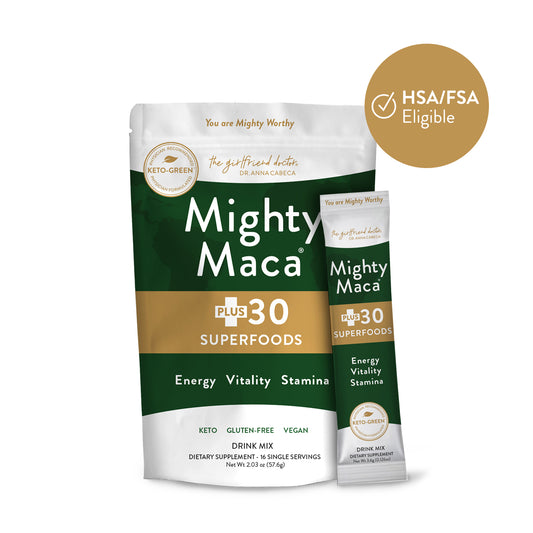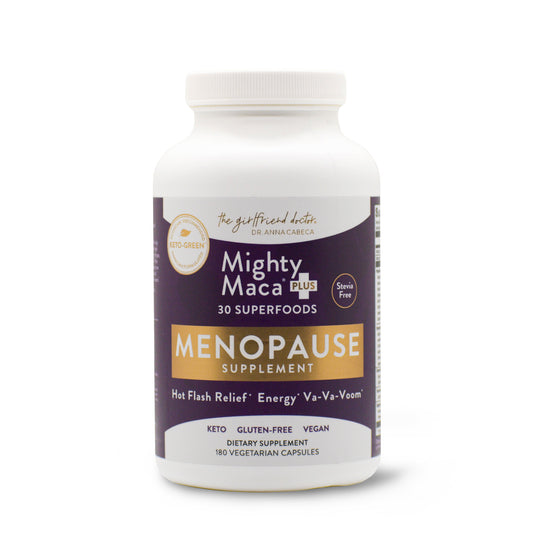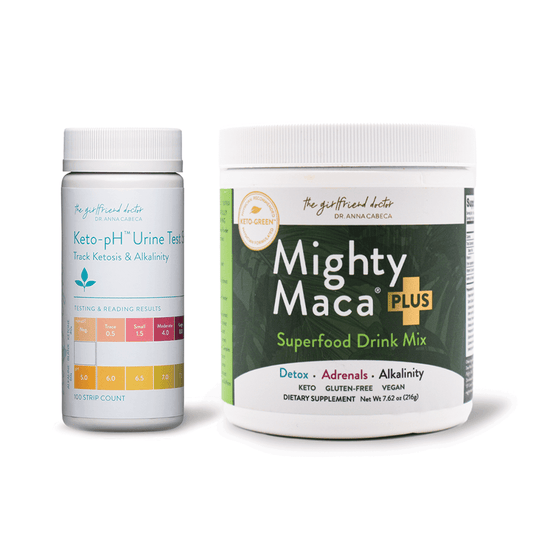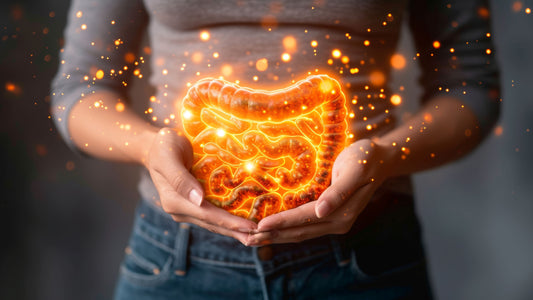The Silent Storm Affecting Millions of Women
If you've been struggling with unexplained mood swings, irregular periods, stubborn weight gain, or persistent fatigue, you're not alone. What many women don't realize is that these symptoms often share a common root cause: chronic inflammation silently wreaking havoc on their hormonal system.
Recent research reveals that inflammatory markers are significantly elevated in women experiencing hormonal imbalances, creating a vicious cycle that can impact everything from fertility to menopause symptoms. Understanding this connection isn't just academic—it's the key to reclaiming your health and vitality.
In This Article, You Will Learn:
• How chronic inflammation disrupts hormone production and regulation
• The specific ways inflammation affects estrogen, progesterone, and cortisol
• Science-backed strategies to reduce inflammatory burden naturally
• Which supplements and lifestyle changes show the strongest evidence for hormonal support
• How to identify if inflammation is contributing to your hormonal symptoms

Understanding the Inflammatory-Hormonal Axis
Your endocrine system and immune system don't operate in isolation—they're intimately connected through what researchers call the "inflammatory-hormonal axis." When your body experiences chronic inflammation, whether from stress, poor diet, environmental toxins, or underlying health conditions, it directly interferes with hormone production and signaling.
A groundbreaking study published in The Journal of Clinical Endocrinology & Metabolism found that women with elevated inflammatory markers (specifically C-reactive protein and interleukin-6) were 40% more likely to experience irregular menstrual cycles and had significantly lower levels of reproductive hormones¹. This research highlights how inflammation doesn't just accompany hormonal issues—it actively contributes to them.
How Inflammation Hijacks Your Hormones
Estrogen Dominance and Inflammatory Pathways
Chronic inflammation can lead to estrogen dominance by interfering with the liver's ability to properly metabolize and clear estrogen from the body. When inflammatory cytokines are elevated, they can disrupt the enzymes responsible for breaking down estrogen, leading to the accumulation of potentially harmful metabolites.
Cortisol Dysregulation
Perhaps most significantly, inflammation triggers a cascade of stress hormones, particularly cortisol. While short-term cortisol elevation is normal and healthy, chronic inflammatory states keep cortisol levels persistently high, which then suppresses other hormone production—including progesterone, thyroid hormones, and even growth hormone.
Insulin Resistance Connection
Inflammation also promotes insulin resistance, which creates hormonal chaos throughout the body. Elevated insulin levels can increase androgen production (leading to symptoms like acne and unwanted hair growth), suppress sex hormone-binding globulin (making hormones more active and potentially problematic), and contribute to weight gain around the midsection.

Common Sources of Chronic Inflammation in Women
Understanding where inflammation comes from is crucial for addressing it effectively. The most common culprits include:
Dietary Inflammatory Triggers
- Processed foods high in refined sugars and trans fats
- Excessive omega-6 fatty acids from vegetable oils
Food sensitivities (particularly gluten and dairy for sensitive individuals)
Alcohol consumption, which can disrupt gut barrier function
Environmental Factors
- Endocrine-disrupting chemicals in plastics, cosmetics, and cleaning products
- Air pollution and heavy metal exposure
Chronic stress from work, relationships, or financial pressures
Poor sleep quality and insufficient sleep duration
Gut Health Disruption
Research increasingly shows that gut inflammation—often called "leaky gut"—is a primary driver of systemic inflammation. When the intestinal barrier becomes compromised, inflammatory compounds can enter the bloodstream and affect hormone-producing tissues throughout the body.
Recognizing the Signs
Hormonal inflammation often presents with subtle but persistent symptoms:
Brain fog and difficulty concentrating
Joint stiffness, particularly in the morning
Digestive issues like bloating or irregular bowel movements
Skin problems, including acne, eczema, or premature aging
Unexplained fatigue that doesn't improve with rest
Mood changes, including anxiety, depression, or irritability
Science-Backed Solutions for Hormonal Inflammation
The Power of Targeted Supplementation
While lifestyle changes form the foundation of anti-inflammatory approaches, specific supplements can provide targeted support for reducing inflammation and supporting hormonal balance.
Mighty Maca® Plus is a comprehensive solution for women dealing with hormonal inflammation. This organic superfood blend contains over 30 nutrient-dense ingredients specifically chosen for their anti-inflammatory and hormone-supporting properties. The maca root provides adaptogenic support to help regulate cortisol, while ingredients like turmeric and ginger offer potent anti-inflammatory compounds.
Customer testimonials consistently highlight improvements in energy levels and hormonal symptoms. As one verified customer shared: "I've been using Mighty Maca Plus for six months, and my energy is through the roof. My periods are more regular, and I feel like myself again. The inflammation in my joints has decreased significantly."
The formula also includes spirulina and chlorella, which research shows can help the body eliminate environmental toxins that contribute to an inflammatory burden. Unlike synthetic supplements, this whole-food approach provides nutrients in forms that are easily recognized and utilized by the body.
AmaZinc offers another crucial piece of the anti-inflammatory puzzle. Zinc deficiency is incredibly common in women and directly contributes to both inflammation and hormonal imbalances. This highly bioavailable zinc supplement supports immune function, helps regulate inflammatory responses, and plays a critical role in hormone synthesis.
Zinc is particularly important for progesterone production and can help balance the estrogen-to-progesterone ratio that often becomes disrupted with chronic inflammation. Clinical studies show that adequate zinc levels can reduce inflammatory markers by up to 25% in women with hormonal imbalances.
Gut Thrive addresses one of the root causes of systemic inflammation: compromised gut health. This comprehensive probiotic and prebiotic formula helps restore the gut microbiome balance that's essential for reducing inflammatory burden throughout the body.
The specific strains included in Gut Thrive have been clinically studied for their ability to strengthen the intestinal barrier, reduce inflammatory cytokine production, and support healthy hormone metabolism. A healthy gut microbiome is also crucial for metabolizing estrogen properly, preventing the accumulation of inflammatory estrogen metabolites.
Dietary Strategies That Work
The Anti-Inflammatory Protocol
Research consistently shows that certain dietary patterns can dramatically reduce inflammatory markers:
Emphasize omega-3 fatty acids from wild-caught fish, walnuts, and flaxseeds
Include plenty of colorful vegetables and fruits rich in antioxidants
Choose anti-inflammatory spices like turmeric, ginger, and cinnamon
Limit refined carbohydrates and processed foods
Consider intermittent fasting, which research shows can reduce inflammatory markers
Timing Matters
When you eat can be as important as what you eat. Studies show that eating late in the evening can increase inflammatory markers and disrupt hormonal rhythms. Aim to finish eating at least three hours before bedtime to optimize both inflammation levels and hormone production.
Lifestyle Modifications for Long-Term Success
Stress Management as Medicine
Chronic stress is perhaps the most significant driver of both inflammation and hormonal disruption. Implementing evidence-based stress reduction techniques isn't just beneficial—it's essential:
Regular meditation practice (even 10 minutes daily) can reduce inflammatory markers by up to 30%
Gentle yoga specifically supports both stress reduction and lymphatic drainage
Deep breathing exercises activate the parasympathetic nervous system, reducing cortisol and inflammatory responses
Sleep Optimization
Quality sleep is when your body performs most of its repair and detoxification processes. Poor sleep directly increases inflammatory markers and disrupts hormone production cycles. Prioritize 7-9 hours of quality sleep by maintaining consistent sleep-wake times and creating an optimal sleep environment.
Movement as Medicine
Regular physical activity is one of the most potent anti-inflammatory interventions available. However, the type and intensity matter enormously for women dealing with hormonal issues:
Moderate aerobic exercise (like brisk walking) reduces inflammatory markers without overtaxing the system
Strength training supports healthy hormone production and improves insulin sensitivity
Excessive high-intensity exercise can actually increase inflammation and cortisol in women with existing hormonal imbalances

Supporting Your Body's Natural Detox Pathways
Your liver, lymphatic system, and kidneys work constantly to eliminate inflammatory compounds and metabolize hormones. Supporting these detoxification pathways is crucial for long-term hormonal health.
Phase I and Phase II Liver Detoxification
The liver processes hormones and inflammatory compounds in two phases, each requiring specific nutrients. Phase I requires B vitamins and antioxidants, while Phase II needs amino acids and sulfur compounds. Cruciferous vegetables like broccoli and Brussels sprouts provide glucosinolates that specifically support hormone metabolism.
Lymphatic System Support
The lymphatic system removes inflammatory waste products from tissues. Unlike the circulatory system, it doesn't have a pump, so it relies on movement and muscle contractions to function properly. Dry brushing, lymphatic massage, and regular movement all support this crucial system.
Environmental Detoxification
Reducing your exposure to environmental toxins is equally important as supporting detoxification:
Choose organic produce when possible, especially for the "Dirty Dozen" fruits and vegetables
Filter your drinking water to remove chlorine, fluoride, and other potential disruptors
Use natural cleaning and personal care products free from endocrine-disrupting chemicals
Consider air purification, especially in urban environments or homes with poor ventilation

Most women begin noticing improvements in energy and mood within 2-4 weeks of implementing anti-inflammatory strategies, with more significant hormonal changes typically occurring over 2-3 months.
The Road to Hormonal Harmony
Addressing the inflammation-hormone connection isn't about quick fixes or temporary solutions—it's about creating sustainable changes that support your body's natural healing capacity. The research is clear: when we reduce inflammatory burden through targeted nutrition, appropriate supplementation, and lifestyle modifications, hormonal balance naturally begins to restore itself.
Remember that every woman's journey is unique. What works for one person may need modification for another, and that's completely normal. The key is consistency with evidence-based approaches while listening to your body's signals and working with healthcare providers who understand the intricate connections between inflammation and hormonal health.
Your hormones don't have to be a mystery or a source of frustration. By understanding and addressing the inflammatory factors that disrupt hormonal balance, you can reclaim your energy, stabilize your mood, and feel like yourself again. The science is on your side, and with the right tools and knowledge, hormonal harmony is absolutely achievable.

Q: How long does it take to see improvements in hormonal symptoms when addressing inflammation?
A: Most women notice initial improvements in energy and mood within 2-4 weeks of implementing anti-inflammatory strategies. More significant hormonal changes, such as cycle regulation and symptom reduction, typically occur over 2-3 months as the body has time to rebalance inflammatory pathways and hormone production.
Q: Can inflammation cause weight gain even if I'm eating well and exercising?
A: Yes, chronic inflammation can absolutely contribute to weight gain through multiple mechanisms: it promotes insulin resistance, elevates cortisol (which encourages fat storage around the midsection), disrupts thyroid function, and can make weight loss significantly more difficult even with proper diet and exercise.
Q: Are there specific blood tests that can help identify if inflammation is affecting my hormones?
A: Key markers include C-reactive protein (CRP), which should be less than 1.0 mg/L for optimal health, along with a comprehensive hormone panel including cortisol rhythm testing. Many functional medicine practitioners also recommend testing for food sensitivities and gut health markers, as these often contribute to systemic inflammation.
Q: Is it safe to take anti-inflammatory supplements with hormonal medications?
A: While natural anti-inflammatory supplements are generally safe, it's important to consult with your healthcare provider before adding supplements to any existing medication regimen. Some supplements can interact with hormonal medications or affect how they're metabolized by the body.
Reference:
1. Gaskins, A.J., et al. (2018). "Association between serum folate and inflammatory markers among women of reproductive age in the United States." The Journal of Clinical Endocrinology & Metabolism, 103(8), 2749-2756.










